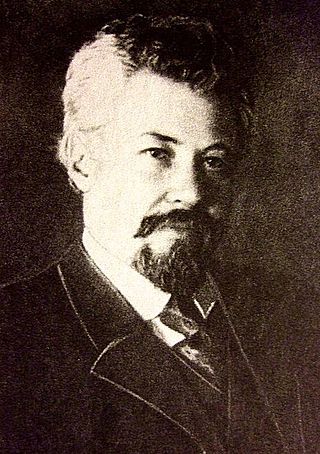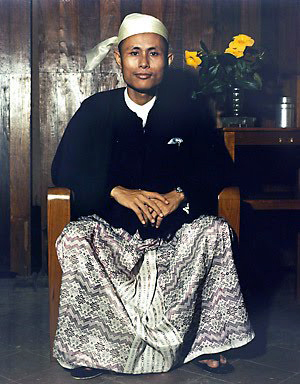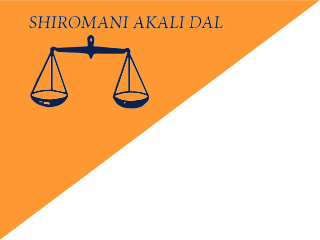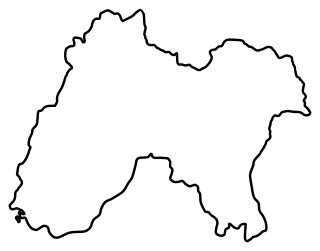
The Independence Party is a conservative political party in Iceland. It is currently the largest party in the Alþingi, with 17 seats. The chairman of the party is Bjarni Benediktsson and the vice chairman of the party is Þórdís Kolbrún R. Gylfadóttir.

Parliamentary elections were held in Sri Lanka on 2 April 2004. The ruling United National Party of Prime Minister Ranil Wickremesinghe was defeated, winning only eighty two seats in the 225-member Sri Lankan parliament. The opposition United People's Freedom Alliance won 105 seats. While this was eight seats short of an absolute majority, the Alliance was able to form a government.

The Pakistan Movement was a political movement in the first half of the 20th century that aimed for the creation of Pakistan from the Muslim-majority areas of British India. It was connected to the perceived need for self-determination for Muslims under British rule at the time. Muhammad Ali Jinnah, a barrister and politician led this movement after the Lahore Resolution was passed by All-India Muslim League on 23 March 1940.

The Anti-Fascist People's Freedom League (AFPFL) was the dominant political alliance in Burma from 1945 to 1958. It consisted of political parties and mass and class organizations.

Elections to the Russian Constituent Assembly were held on 25 November 1917, although some districts had polling on alternate days, around two months after they were originally meant to occur, having been organized as a result of events in the February Revolution. They are generally recognised to be the first free elections in Russian history. The dissolution of the Constituent Assembly was also approved by the Left Socialist Revolutionaries and anarchists; both groups were in favour of a more extensive democracy.

General elections were held in Myanmar on 27 May 1990, the first multi-party elections since 1960, after which the country had been ruled by a military dictatorship. The elections were for a parliament-sized constitutional committee to draft a new constitution.

The Burma Workers Party, until 1958 the Burma Workers and Peasants Party, was a communist party in Burma, formed on 8 December 1950 by leftist elements of the Socialist Party. In December 1962 it merged with the People's Comrade Party to form the United Workers Party. In March 1964, it was among the many parties banned by decree of the Revolutionary Council.

The Alliance Party was a political coalition in Malaysia. The Alliance Party, whose membership comprised United Malays National Organisation (UMNO), Malaysian Chinese Association (MCA) and Malaysian Indian Congress (MIC), was formally registered as a political organisation on 30 October 1957. It was the ruling coalition of Malaya from 1957 to 1963, and Malaysia from 1963 to 1973. The coalition became the Barisan Nasional in 1973.

General elections were held in Burma to vote for 202 out of 250 seats to the Burmese Chamber of Deputies; the remaining 48 members were elected unopposed as no opposition candidates stood against them.

General elections were held in Burma on 9 April 1947 to form the basis of a constituent assembly that would design a constitution once independence from the United Kingdom had been achieved. They were the first elections in Burma since its separation from India under the British Raj. Voter turnout was 49.8%. However, Aung San was assassinated three months later, resulting in U Nu becoming the first Prime Minister of Burma.

Provincial elections were held in British India in January 1946 to elect members of the legislative councils of the Indian provinces. The Congress, in a repeat of the 1937 elections, won (90%) of the general non-Muslim seats while the Muslim League won the majority of Muslim seats (87%) in the provinces.

The Shiromani Akali Dal (SAD) is a centre-right Sikh-centric state political party in Punjab, India. The party is the second-oldest in India, after Congress, being founded in 1920. Although there are many parties with the description Akali Dal, the party that is recognized as "Shiromani Akali Dal" by the Election Commission of India is the one led by Sukhbir Singh Badal. The party has a moderate Punjabi agenda. On 26 September 2020, they left the NDA over the farm bills.

The Patriotic Alliance was a political alliance in Burma.

The People's Democratic Front (PDF) was a political alliance in Burma.

The United Hill People's Congress was a political party in Burma.

The United Nationalities League for Democracy was a political alliance in Myanmar.

The 2nd Congress of the Communist Party of India was held in Calcutta, West Bengal from 28 February to 6 March 1948. At the Second Party Congress, the party line shifted dramatically under the new General Secretary B.T. Ranadive and subsequently the party engaged in revolutionary insurrections across the country.

Elections to the Punjab Provincial Assembly were held in January 1946 as part of the 1946 Indian provincial elections.















